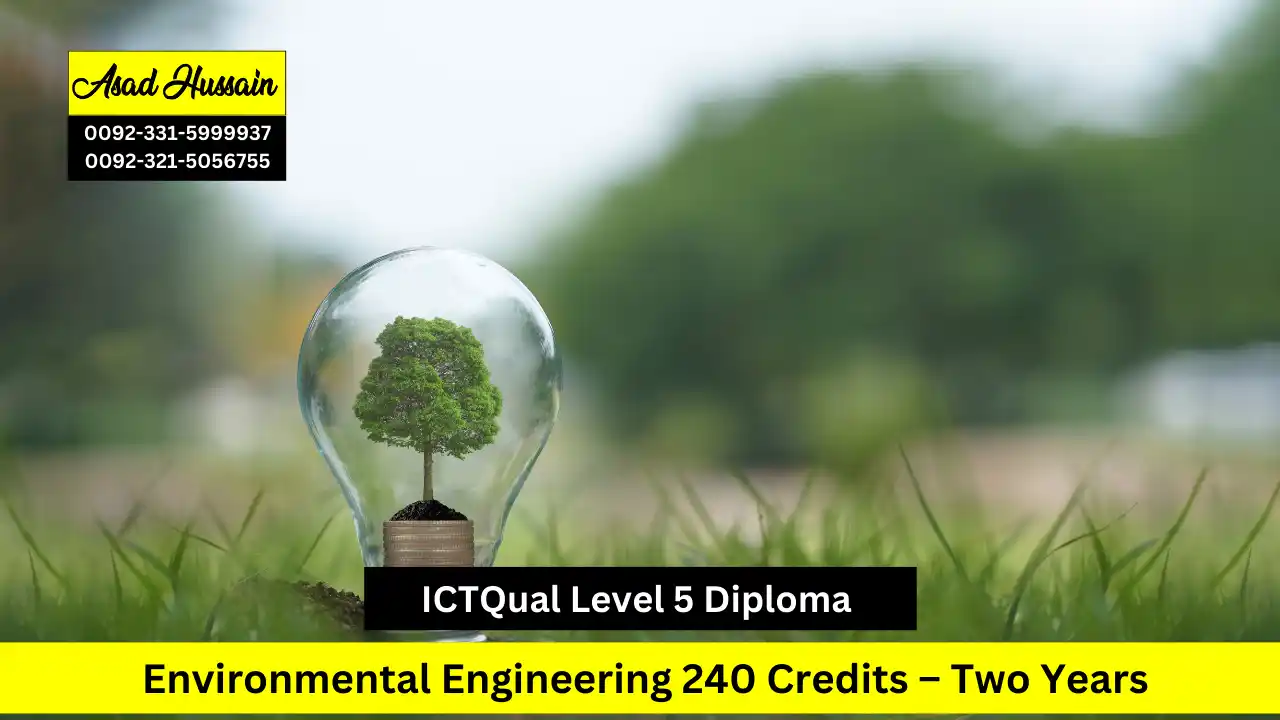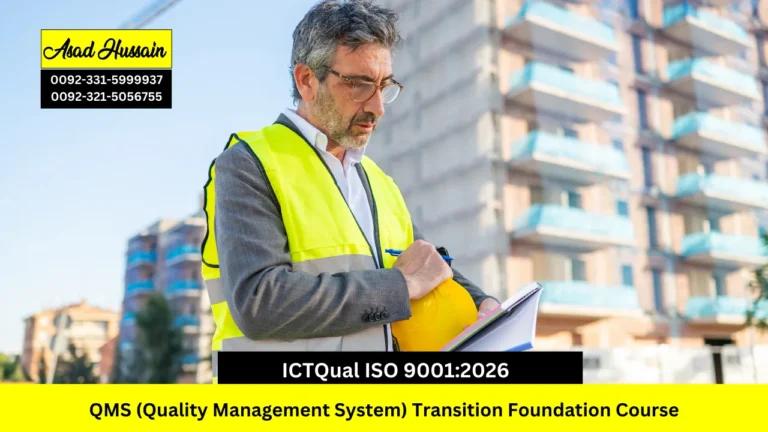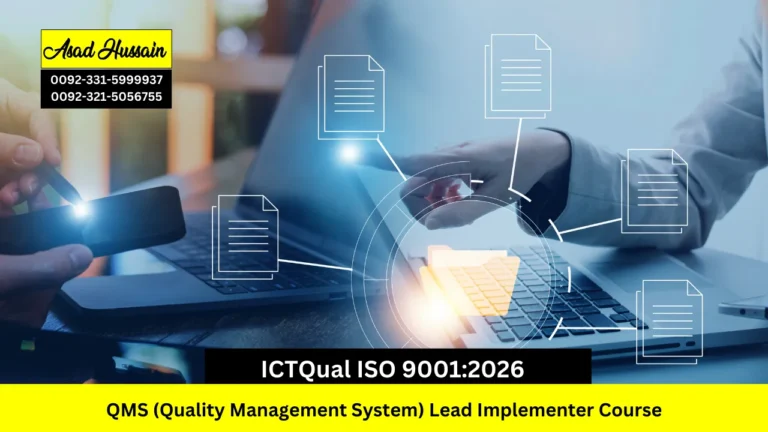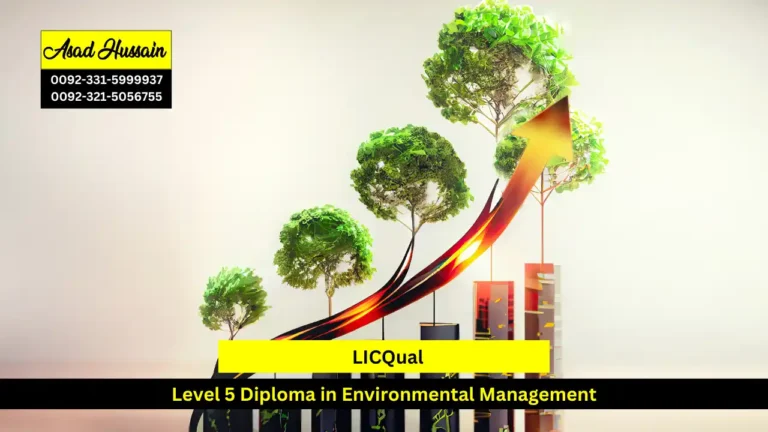In an era marked by environmental challenges, sustainable development, and the growing need for green technologies, professionals equipped with the knowledge and expertise to tackle environmental issues are in high demand. One such qualification that offers the tools to make a difference is the ICTQual Level 5 Diploma in Environmental Engineering. This program, which spans two years and accumulates 240 credits, provides an in-depth understanding of the technical, regulatory, and innovative aspects of environmental engineering.
The ICTQual Level 5 Diploma in Environmental Engineering is a comprehensive qualification designed for individuals who wish to build a career in the environmental sector. It blends technical skills with practical knowledge in areas such as environmental monitoring, waste management, renewable energy, water treatment, and sustainability. The two-year program is structured to deliver not only theoretical insights but also hands-on experiences, ensuring that students are equipped to meet the evolving demands of the environmental engineering field.
The ICTQual Level 5 Diploma in Environmental Engineering is a robust and forward-thinking program that equips individuals with the necessary tools to address the growing environmental challenges of the modern world. With its focus on sustainability, cutting-edge technologies, and practical experience, it offers graduates an excellent opportunity to make a tangible difference in environmental engineering. Whether you are looking to enter the field or advance your career, this qualification provides the knowledge and expertise to help you thrive in a sustainable future.
Program Highlights
Year 1
- Introduction to Environmental Science
- Fundamentals of Environmental Engineering
- Sustainable Development Practices
- Climate Change and its Impacts
- Pollution Control Technologies
- Energy Systems and Environmental Impact
- Environmental Legislation and Policy
- Water Quality Management
- Waste Management and Resource Recovery
- Environmental Risk Assessment
- Environmental Health and Safety
- Introduction to Renewable Energy
Year 2:
- Ecosystem and Biodiversity Management
- Environmental Data Collection and Analysis
- Environmental Monitoring and Reporting
- Advanced Environmental Engineering
- Renewable Energy Technologies
- Environmental Economics and Sustainability
- Land Rehabilitation and Restoration
- Environmental Impact Assessment (EIA)
- Green Building and Sustainable Infrastructure
- Pollution Prevention and Waste Minimization
- Environmental Management Systems (EMS)
- Sustainable Transport and Mobility
To enroll in the ICTQual Level 5 Diploma in Environmental Engineering, candidates must meet the following entry requirements:
- Applicants must be at least 18 years old.
- A minimum of a Level 4 qualification (or equivalent) in a relevant field such as environmental science, engineering, or another technical discipline. Acceptable qualifications may include A-levels, a Level 4 Diploma, or a relevant vocational qualification.
- Alternatively, candidates should have at least GCSEs (or equivalent) with a grade C or higher in Mathematics and English.
- While prior experience in environmental engineering is not necessary, applicants with a background in environmental science, sustainability, or technical subjects may find the course more manageable.
- Non-native English speakers may be required to provide proof of English language proficiency, typically through an IELTS score of 6.0 or equivalent, to ensure they can fully engage with the course material.
Year 1: Learning Outcomes
- Introduction to Environmental Science
- Understand basic environmental science concepts, ecosystems, and biodiversity.
- Recognize human impacts on the environment and the importance of sustainability.
- Fundamentals of Environmental Engineering
- Demonstrate knowledge of core environmental engineering principles and practices.
- Apply engineering solutions to address environmental challenges.
- Sustainable Development Practices
- Develop an understanding of sustainable development theories and practices.
- Analyze strategies for balancing environmental, economic, and social factors.
- Climate Change and its Impacts
- Understand the causes and effects of climate change on ecosystems and human societies.
- Evaluate mitigation and adaptation strategies to combat climate change.
- Pollution Control Technologies
- Identify various pollution control technologies for air, water, and soil.
- Assess the effectiveness of pollution control methods in different contexts.
- Energy Systems and Environmental Impact
- Understand the environmental impact of traditional and alternative energy systems.
- Explore methods to reduce the environmental footprint of energy production.
- Environmental Legislation and Policy
- Identify key environmental laws and policies at national and international levels.
- Understand the role of government regulations in environmental protection.
- Water Quality Management
- Learn techniques for assessing and improving water quality.
- Apply water management practices to prevent pollution and ensure sustainability.
- Waste Management and Resource Recovery
- Examine waste management strategies and technologies.
- Promote resource recovery and recycling to reduce landfill dependency.
- Environmental Risk Assessment
- Understand environmental risk assessment methodologies.
- Analyze and manage potential environmental risks from industrial or natural sources.
- Environmental Health and Safety
- Identify health and safety risks in environmental engineering practices.
- Implement measures to protect public health and safety in environmental projects.
- Introduction to Renewable Energy
- Learn about various renewable energy sources and their applications.
- Assess the environmental benefits and challenges of renewable energy systems.
Year 2: Learning Outcomes
- Ecosystem and Biodiversity Management
- Understand ecosystem dynamics and biodiversity conservation strategies.
- Develop management practices to protect and restore ecosystems.
- Environmental Data Collection and Analysis
- Gain skills in collecting and analyzing environmental data.
- Use data to inform decision-making in environmental engineering projects.
- Environmental Monitoring and Reporting
- Learn methods for monitoring environmental quality and sustainability.
- Develop clear, comprehensive environmental reports for stakeholders.
- Advanced Environmental Engineering
- Apply advanced environmental engineering concepts to solve complex environmental issues.
- Evaluate engineering solutions for sustainability and long-term effectiveness.
- Renewable Energy Technologies
- Explore advanced renewable energy technologies, including solar, wind, and bioenergy.
- Assess the feasibility and impact of integrating renewable energy into existing systems.
- Environmental Economics and Sustainability
- Understand the economic principles of sustainability.
- Evaluate the cost-benefit of environmental projects and their long-term economic viability.
- Land Rehabilitation and Restoration
- Learn techniques for land restoration and rehabilitation after environmental damage.
- Design and implement land restoration projects to improve ecosystem services.
- Environmental Impact Assessment (EIA)
- Gain expertise in conducting Environmental Impact Assessments for projects.
- Analyze the potential environmental effects of development and suggest mitigation strategies.
- Green Building and Sustainable Infrastructure
- Understand sustainable building practices and green construction techniques.
- Integrate environmental considerations into infrastructure design and construction.
- Pollution Prevention and Waste Minimization
- Develop strategies to prevent pollution at the source.
- Apply waste minimization techniques to reduce environmental impacts.
- Environmental Management Systems (EMS)
- Learn to design and implement Environmental Management Systems (EMS) in organizations.
- Promote environmental compliance and continuous improvement in sustainability practices.
- Sustainable Transport and Mobility
- Understand sustainable transportation systems and their impact on urban planning.
- Evaluate policies and technologies to reduce transportation-related environmental damage.
The ICTQual Level 5 Diploma in Environmental Engineering (240 Credits – Two Years) is designed for individuals who are passionate about environmental sustainability and want to pursue a career in the environmental engineering sector. This course is ideal for:
1. Aspiring Environmental Engineers:
- Individuals looking to enter the field of environmental engineering and acquire the necessary knowledge and skills to address pressing environmental challenges such as pollution, waste management, water treatment, and climate change.
2. Professionals Seeking Career Advancement:
- Those who already work in related sectors such as civil engineering, environmental science, or sustainability, and wish to advance their careers by gaining specialized qualifications in environmental engineering.
3. Graduates of Relevant Fields:
- People who hold a Level 4 qualification in areas such as environmental science, engineering, or another technical discipline, and want to build on that foundation to pursue a higher level of expertise in environmental engineering.
4. Career Changers:
- Individuals with a background in a different field but a strong interest in sustainability and environmental protection, looking for a structured pathway into the environmental engineering industry.
5. Government and NGO Professionals:
- Those working within government agencies or non-governmental organizations (NGOs) who are involved in environmental policy, regulation, and management, and wish to enhance their technical understanding of environmental engineering practices.
6. International Students:
- The course is also open to international students with the required qualifications and English proficiency. It offers global recognition, making it a great choice for those looking to work in the international environmental sector.
7. Individuals Passionate About Sustainability:
- If you are passionate about creating a positive environmental impact and contributing to the fight against climate change, this diploma provides you with the tools and knowledge to drive sustainable solutions.







